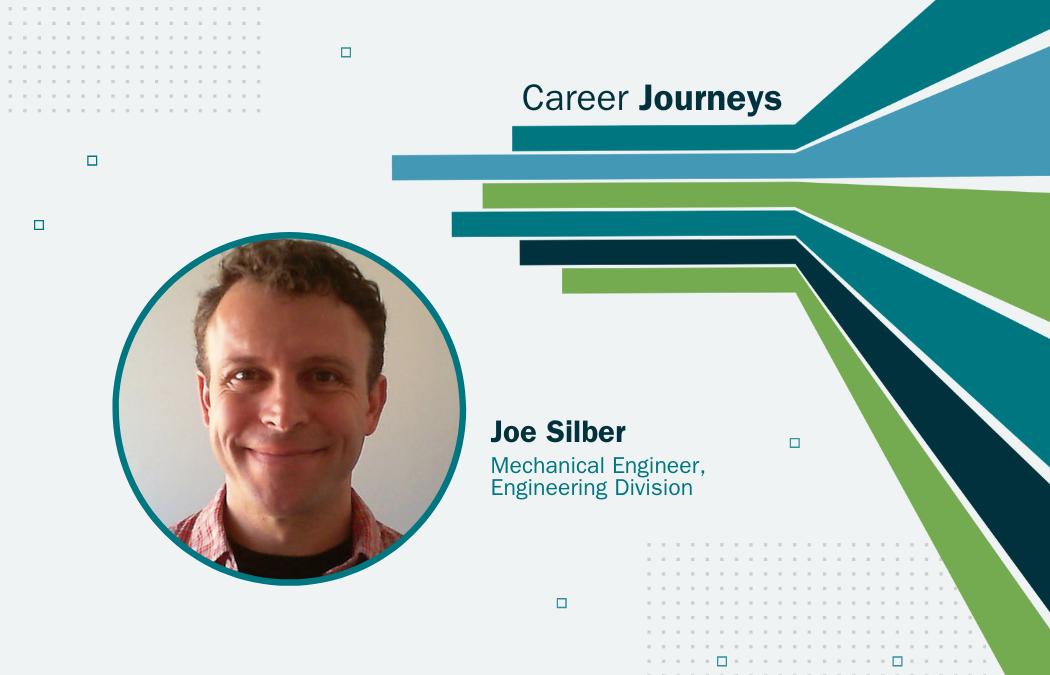Joe Silber’s first love was art – drawing, painting, photography, and sculpture. But once he began working at an engineering firm he saw that art was present in everyday things.
“One thing that sometimes surprises people is that my original degree was in studio art,” said Silber, now a mechanical engineer at Berkeley Lab’s Engineering Division working mostly on physics projects. “In my twenties, I worked at a couple of small firms in Emeryville that were building bicycle-pedestrian bridges and those electronic bike lockers you see at BART stations.”
At first, he thought “Engineering sucks, it’s so boring,” but after working on a few projects, and transferring from City College, in San Francisco, to UC Berkeley’s engineering program, he was hooked. Then a chance meeting with a Berkeley Lab engineer who shared his love of composite materials led to a career at the Lab.
“Holding on to that big picture belief in our scientific goals, and to your own enjoyment and curiosity in the science. That’s what we’re really after.”
– Joe Silber
Q: Tell us about the different jobs you’ve had on your career journey, and what brought you to Berkeley Lab?
A: I did my math and physics at City College before transferring to UC Berkeley to study engineering. The Society of Automotive Engineers there hosts a big, yearly competition to design race cars, and I joined that team. That’s where I ended up meeting one of the Lab’s lead composites engineers, Eric Anderson.
Most people on these teams are automobile fanatics; they really geek out on that stuff. But for me, what was interesting was getting to build a carbon fiber chassis using these space-age, high-performance materials you put into molds like you’re making surfboards.
Carbon fiber materials are essential to building the large detectors that we put on big particle colliders like the Relativistic Heavy Ion Collider, at Brookhaven National Lab, or the Large Hadron Collider at CERN.
Eric thought I would be a good fit at the Lab, and I applied for a job here in 2010.
Q: If you’ve had mentors during your career, either formal or informal, how have they shaped your career path?
A: I have one clear career inflection point, which was a conversation with my dad when I was in my early twenties. I had this art degree, but I had never considered myself an artist. I didn’t want to go into the art world and try to sell my art. I did it because it was really fascinating to me, but I didn’t know what to do next.
I had worked for some firms; I was doing some teaching, but I wanted to do something highly technical. So, I found this subject called library science, which is very interesting, and didn’t require much in the way of prerequisites.
I tried to sell the idea to myself by talking to my dad about it, and he just said, “This isn’t for you; you should do more,” which was a rare thing for him to say. But the message was so crystal clear that it turned my mind. That’s when I went on the longer path, diving back into math and physics and ultimately going to Berkeley, getting my master’s, and then coming here to the Lab.
Q: What career challenges have you experienced that you learned from or that helped your future success?
A: The most challenging point for me at the Lab was during the DESI project, or the Dark Energy Spectroscopic Instrument project. I came into it as a young engineer focused on design and manufacturing, and knowing a little bit about robotics and software.
Midway through the project, I took on management responsibility. Now, some people are very natural managers, but for some, it’s a real challenge. I had a lot of learning to do. But one of the things that I appreciated being here at the Lab, particularly with our Engineering Division leaders and DESI project leaders, is that when they saw me struggling through my inexperience, they made sure to bring senior people in to help me get through.
We ended up building a fabulously complicated and interesting instrument that’s like nothing that’s ever been built before: This system of 5,000 little robots all simultaneously moving these optical fibers on top of a telescope on a mountain in Arizona. It’s really cool and complicated to execute.
Q: What’s the most important piece of career advice that you could relay to someone who is considering working at the Lab or perhaps is starting their career?
A: There’s one piece that I think is a bit of a cliche, but it’s true, is learning to say no.
But what matters, in my heart, is the end goal of the science we’re trying to achieve and knowing that I’m contributing to important and interesting discoveries.
Interesting science work makes all of the hard work that we do worth it, whether it’s your job communicating what we do the science to our community or my job picking the right bolts to hold up a telescope.
I talk sometimes to some younger engineers, and they tell me they’re frustrated by some set of constraints they didn’t invent or that were imposed on them. The best answer for that is holding on to that big picture belief in our scientific goals, and to your own enjoyment and curiosity in the science. That’s what we’re really after.

1 Comment
dear joe,
this was a wonderful fun bio. and great inspiration to future engineers. but obviously what touched me most was your reference to my advice to you to go big and not just settle for library science. this brought me to happy tears.
love, dad